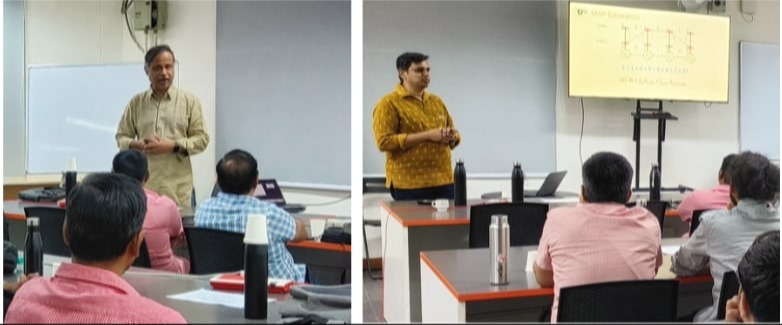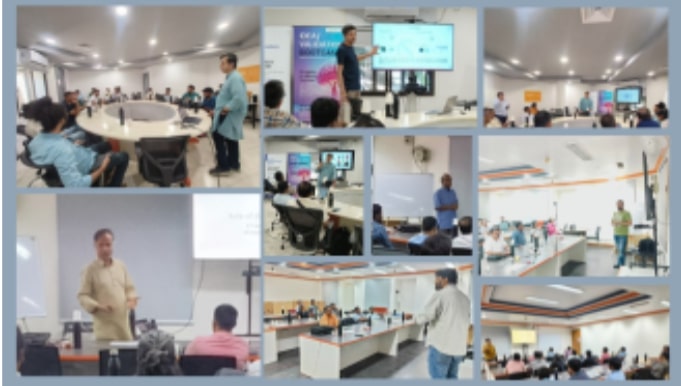Why CV Labs?
Startups often operate with a strong product vision but limited access to cutting-edge research. On the other hand, researchers create powerful innovations that rarely see real-world application. CV Labs bridges this disconnect. It creates a structured, focused space where both communities can meet, exchange ideas, and explore how research can be translated into scalable technologies.
At the heart of CV Labs are quarterly, domain-specific workshops, each tailored to a specific area of deep tech. The most recent edition, held in March, focused on Computer Vision.
Workshop Structure: Two Weeks of Deep Engagement
The CV Labs workshop spans two weeks, blending in-person and virtual formats to maximize accessibility and impact:
Week 1: In-Person Exploration
- Startups visit the IIIT-H campus for three days.
- Faculty conduct in-depth, 2–3 hour lectures, customized to the workshop theme.
- Sessions cover both foundational principles and cutting-edge research trends.
Week 2: Online Mentorship
- Startups are matched with relevant research labs for one-on-one virtual mentoring.
- These sessions dive into the startups' technology stacks, challenges, and vision.
- Faculty and RAs provide technical feedback, suggest pivots, and share applicable research tools or approaches.
Final Day: On-Campus Reviews
- Startups return to IIIT-H to present:
- What they learned
- What they changed
- How their product and strategy evolved through the workshop
This structure allows for immersion, iteration, and insight, and many startups leave with a stronger technical foundation and a clearer path forward.

Inside the Computer Vision Edition
This edition spotlighted the Computer Vision Research Centre, with faculty mentors along with Thrupthi, Aditya, and Shankar leading the charge. Around 10 startups participated, ranging from vision-first companies to those incorporating vision as a feature.
After the initial lecture series, startups were grouped and assigned mentors from the CV Lab. These mentors worked closely with each company during the second week, analyzing everything from product design to model feasibility. The goal was simple: help startups turn research into real-world, marketable capabilities.
“This Was a Real Eye-Opener” – Startup Reflections
One consistent theme across feedback was clarity. Many founders came in with grand ideas—some believing they could integrate complex CV models out-of-the-box. Through structured mentorship and faculty insights, most realized they needed to rethink timelines, prioritize intelligently, or even pivot.
As Thrupthi explained, “Startups came in with varying levels of experience. But almost all of them said their thinking evolved. One major shift was understanding that data is not just about quantity, but about pipeline design and experimentation.”
Another key learning was how assumed complexity often didn’t match real-world difficulty. Tasks considered ‘easy’ turned out to be major engineering challenges, while some ‘hard’ problems had elegant research-backed solutions.
Avanija Ramanan, who leads IIIT-H’s Continuous Integration (CI) team, noted: “Founders told us the workshop was an eye-opener. For some, it triggered complete pivots. Others realized they could go beyond a functional MVP to something innovative, with the right research lens.”
She emphasized that despite IIIT-H’s frequent outreach via posters and updates, many startups still underestimate the institute’s real technical depth. “Once they’re inside, they’re amazed.”
From Exposure to Long-Term Engagement
The CV Labs model is not just about short-term insight—it’s about ongoing collaboration. Startups that align well with faculty interests are encouraged to join Root Node, a six-month engagement where researchers serve as scientific advisors, guiding product evolution beyond PoC.
For others, follow-up calls and re-engagement touchpoints ensure that connections built during the workshop don’t fizzle out.
Workshops include daily 30–45 minute technical sessions tailored to each startup’s needs. Beyond the core lectures, startups get hands-on support from faculty and research associates—creating a rare mix of academic rigor and startup agility.
A Spectrum of Mindsets – A Need for Translation
Perhaps one of the most insightful reflections came from Thrupthi, who explained that researchers and startups often operate with very different lenses:
“Researchers focus on what’s possible—on exploration, feasibility, novelty. Startups focus on what’s doable—on integration, product, and go-to-market fit.”
She described this as a spectrum:
Research → Engineering → Startups → Products → Consumers
A research paper might prove a concept. But turning that into a usable, reliable product involves layers of engineering, testing, and adaptation—steps that startups must prioritize but researchers may not.
Recognizing and bridging this gap in perspective is core to what CV Labs does. It doesn’t just transfer knowledge—it translates it.
Looking Ahead
CV Labs is quickly becoming a model for how academia and startups can work not in parallel, but in partnership. With each workshop, the initiative proves that when researchers and entrepreneurs truly engage, innovation moves faster—and deeper.
For startups eager to ground their products in research, and for researchers excited to see their work out in the real world, CV Labs offers a rare and powerful meeting ground.


